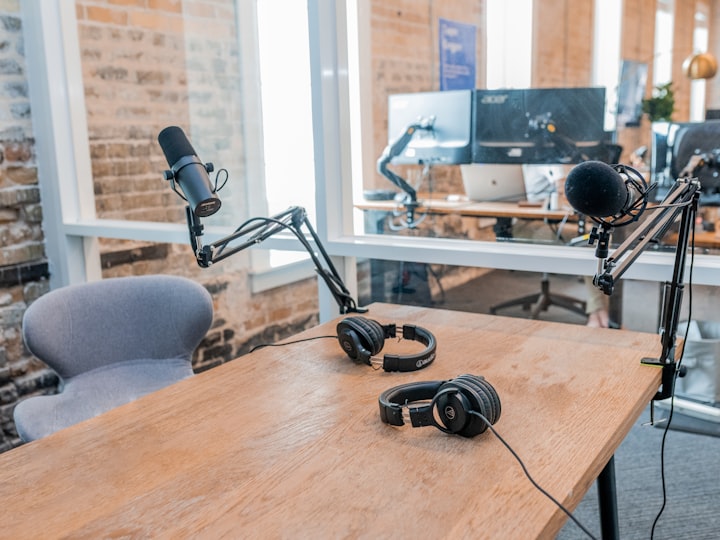Podcasting for Education
How Audio Content is Revolutionizing Learning

In recent years, podcasting has gained tremendous popularity as a versatile and accessible medium for consuming content. While initially associated with entertainment and storytelling, podcasts have also made significant strides in the realm of education. In this article, we will explore how podcasting is revolutionizing learning and transforming the educational landscape.
Podcasts offer a unique and engaging way to deliver educational content to learners of all ages. With their audio format, podcasts can be easily accessed and consumed anytime, anywhere, making them ideal for individuals with busy schedules or those seeking flexible learning options. Whether it's during a commute, a workout, or while doing household chores, podcasting allows learners to make the most of their time by turning mundane activities into valuable learning opportunities.
One of the key advantages of podcasting for education is the ability to bring in diverse voices and perspectives. Educators, experts, and enthusiasts from various fields can create podcasts to share their knowledge and insights with a global audience. This opens up a world of learning possibilities, allowing listeners to access specialized knowledge, explore new subjects, and gain exposure to different ideas and perspectives.
Podcasts also foster active and independent learning. Unlike traditional classroom settings, where learners passively receive information, podcasts encourage active engagement. Listeners can pause, rewind, and revisit content, enabling them to digest information at their own pace. Furthermore, many podcasts incorporate interactive elements, such as quizzes, discussions, and interviews, which prompt listeners to reflect on the material and deepen their understanding.
Another benefit of podcasting is the opportunity for personalized learning experiences. With the vast range of podcast topics available, learners can choose content that aligns with their interests, goals, and preferred learning styles. This personalized approach to education promotes self-directed learning, allowing individuals to explore subjects they are passionate about and delve into areas of curiosity and relevance to their lives.
Podcasts also foster a sense of connection and community. Many podcasts have dedicated online communities where listeners can engage in discussions, share insights, and seek clarification on complex topics. These communities provide learners with a support network, allowing them to connect with like-minded individuals, collaborate on projects, and exchange ideas, ultimately enhancing the learning experience.
Furthermore, podcasting has proven to be a powerful tool for breaking down barriers to education. In underserved communities or regions with limited access to educational resources, podcasts can bridge the gap by providing free, easily accessible content. This democratization of education allows individuals from all walks of life to access quality learning materials and expand their knowledge without significant financial or geographical constraints.
Educational institutions have also recognized the value of podcasting as a supplement to traditional learning methods. Many schools, colleges, and universities are incorporating podcasting into their curriculum, either as supplemental resources or as a means for students to create their own educational content. This hands-on approach not only enhances students' understanding of the subject matter but also develops valuable skills such as research, critical thinking, and effective communication.
As podcasting continues to evolve, the future holds even greater potential for its integration into education. Advancements in technology, such as automatic transcription and language translation, may further enhance accessibility and inclusivity. Additionally, the emergence of interactive podcasting platforms and augmented reality applications could create immersive learning experiences, blurring the lines between audio content and real-world interactions.
Furthermore, podcasting provides educators with a platform to experiment with innovative teaching methods and instructional approaches. By leveraging the power of storytelling, podcasts can captivate learners' attention and create a narrative-driven learning experience. Educators can incorporate real-life examples, case studies, and personal anecdotes to make complex concepts more relatable and engaging for students.
Podcasts also offer a gateway to interdisciplinary learning. Many educational podcasts cover topics that span multiple disciplines, encouraging learners to make connections across various subjects. This interdisciplinary approach fosters a holistic understanding of complex issues and nurtures critical thinking skills.
Podcasts can also play a significant role in professional networking and mentorship. Many podcasts feature interviews with successful individuals who share their career journeys, insights, and advice. This exposure to different professionals and their experiences can inspire and guide aspiring professionals, providing them with valuable mentorship in a virtual format.
Additionally, podcasting offers opportunities for students to develop their communication and presentation skills. Creating a podcast requires planning, scripting, and recording, as well as effective delivery of content. Students can enhance their verbal communication skills, develop their voice, and gain confidence in public speaking through podcasting projects. This hands-on experience prepares them for future presentations, interviews, and other communication challenges they may encounter.
As podcasting continues to gain momentum, it is essential to address potential challenges and considerations. Quality control and accuracy of information are important aspects to consider, as podcasting allows for a wide range of content creators, some of whom may not be experts in their fields. Encouraging critical thinking and media literacy skills can help learners evaluate the credibility and reliability of podcast content.
In conclusion, podcasting has become a powerful tool for education, offering unique benefits and opportunities for learners and educators alike. With its accessibility, personalized nature, and diverse range of topics, podcasting has the potential to transform the way we learn and engage with educational content. By embracing podcasting as a complementary learning medium, educators can tap into the vast potential of audio-based education and create meaningful and impactful learning experiences for their students.
About the Creator
Kenneth Argüello
Welcome to my page! In this space Ill be sharing my passions and curiosities
Enjoyed the story? Support the Creator.
Subscribe for free to receive all their stories in your feed. You could also pledge your support or give them a one-off tip, letting them know you appreciate their work.






Comments
There are no comments for this story
Be the first to respond and start the conversation.